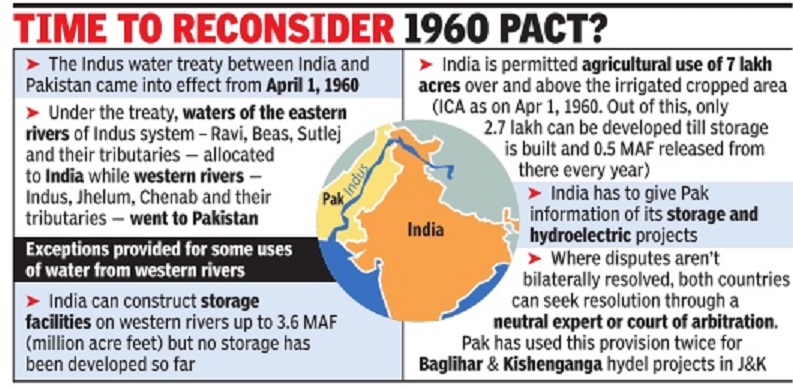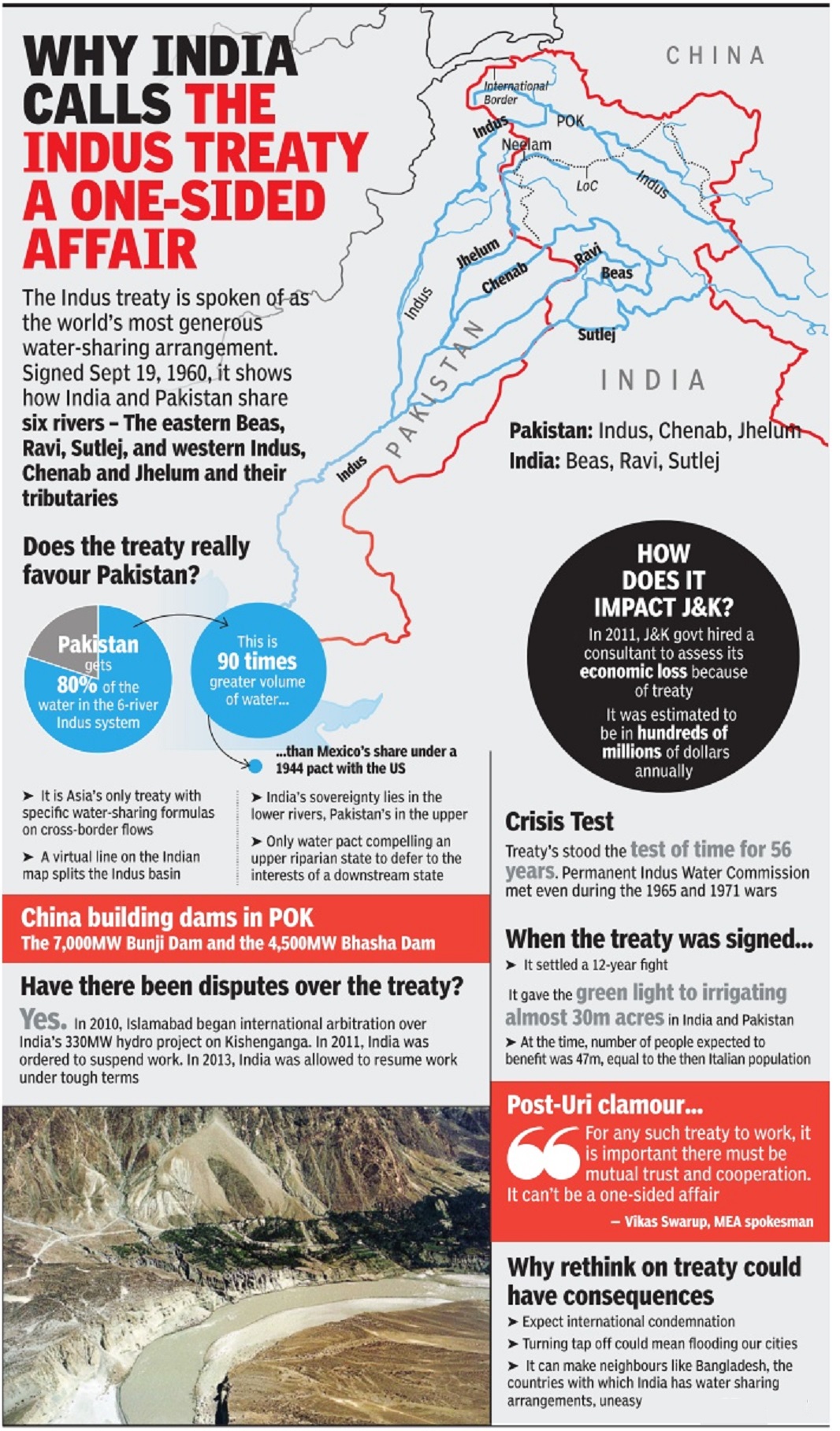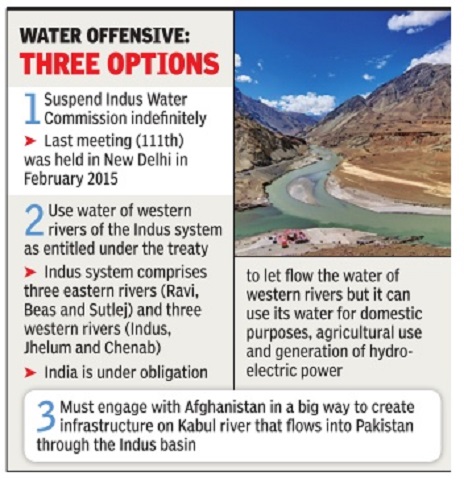Indus Water Treaty
| Line 6: | Line 6: | ||
|} | |} | ||
[[File: Indus Water Treaty the basics.jpg|Indus Water Treaty the basics http://epaperbeta.timesofindia.com/Gallery.aspx?id=23_09_2016_001_031_011&type=P&artUrl=Veiled-threat-Indus-Waters-Treaty-cant-be-one-23092016001031&eid=31808<br/> [ ''The Times of India'']|frame|500px]] | [[File: Indus Water Treaty the basics.jpg|Indus Water Treaty the basics http://epaperbeta.timesofindia.com/Gallery.aspx?id=23_09_2016_001_031_011&type=P&artUrl=Veiled-threat-Indus-Waters-Treaty-cant-be-one-23092016001031&eid=31808<br/> [ ''The Times of India'']|frame|500px]] | ||
| − | |||
| − | |||
[[Category:India |I ]] | [[Category:India |I ]] | ||
| Line 15: | Line 13: | ||
[[Category:Economy-Industry-Resources |I ]] | [[Category:Economy-Industry-Resources |I ]] | ||
[[Category:Law,Constitution,Judiciary |I ]] | [[Category:Law,Constitution,Judiciary |I ]] | ||
| + | =One-sided, against India= | ||
| + | ==India’s options vis-à-vis Pakistan== | ||
| + | [[File: Indus Water Treaty one sided.jpg| Indus Water Treaty: why it is one sided<br/> [http://epaperbeta.timesofindia.com/Gallery.aspx?id=24_09_2016_032_010_003&type=P&artUrl=WHY-INDIA-CALLS-THE-INDUS-TREATY-A-ONE-24092016032010&eid=31808 ''The Times of India'']|frame|500px]] | ||
| + | [[File: Indus Water Treaty India's options.jpg|Indus Water Treaty: India's options <br/> [http://epaperbeta.timesofindia.com/Article.aspx?eid=31808&articlexml=Shun-extreme-options-punish-Pak-by-diluting-Indus-24092016017007 ''The Times of India'']|frame|500px]] | ||
| + | [http://epaperbeta.timesofindia.com/Article.aspx?eid=31808&articlexml=Shun-extreme-options-punish-Pak-by-diluting-Indus-24092016017007 Vishwa Mohan, Shun extreme options, punish Pak by diluting Indus treaty: Experts, Sep 24 2016 : The Times of India] | ||
| + | |||
| + | Amid clamour for a rethink on the Indus Waters Treaty with Pakistan in the wake of the Uri terror strike, experts have argued that short of the “extreme“ step of abrogation, India has other options like use of water of western rivers of the Indus system or suspension of the meetings of Indus Water Commission to put pressure on its neighbour. | ||
| + | |||
| + | The experts point out that these available options would be enough to send signal to Pakistan about the leverage India has over the entire river system without actually scrapping the treaty or violating any of its clauses. | ||
| + | |||
| + | “Abrogation of treaty is neither practical nor desirable. India can rather go for the extreme option of suspending the meeting of the Commission. However, the more realistic option would be to use water of the western rivers of the Indus system, which is well within the framework of the treaty ,“ said Uttam Sinha of the Institute of Defence Studies and Analyses (IDSA). | ||
| + | |||
| + | Under the Indus Water Treaty , signed between the two countries in 1960, water of eastern rivers (Ravi, Beas and Sutlej) are allocated to India while the country is under obligation to let flow the water of the western rivers (Indus, Jhelum and Chenab) to Pakistan. | ||
| + | |||
| + | India can, however, use the water from the western rivers for its domestic purposes, irrigation and generating hydro-electric power. | ||
| + | |||
| + | “We should use this option legitimately . It is India's right under the treaty . Pakistan cannot challenge this as it knows that India can use water of western rivers under the specified clauses of the treaty. If India exercises this option, it would be enough to put Pakistan under extreme pressure,“ Sinha told TOI on Friday . | ||
| + | |||
| + | River expert and environmentalist Himanshu Thakkar of the South Asia Network on Dams, Rivers and People (SANDRP) agrees with such an option. India has been permitted to construct storage of water on western rivers up to 3.6 million acre feet (MAF) for various purposes, but the country has, so far, not developed any storage facility . | ||
| + | |||
| + | Thakkar said, “We have never exercised our rights under the treaty as we have not created infrastructure on our side to use water of western rivers. We must, therefore, concentrate on building barrages and other storage facilities to use the water.“ | ||
| + | |||
| + | Thakkar too found the idea of abrogating the treaty impractical. He said, “It will not solve any purpose. It won't help India militarily . It will, instead, damage India's credibility at international forums. We have treaties and water-sharing arrangements with other neighbours like Nepal, Bhutan, Bangladesh and China. Abrogation of treaty will certainly not send the right signal.“ | ||
| + | |||
| + | The experts also pointed at the third option where India can align itself with Afghanistan by helping it create infrastructure on the Kabil river that flows into Pakistan through the Indus basin. | ||
| + | |||
| + | Sinha said, “Though India has been engaged with Afghanistan, there is a need to go for it in a big way in our strategic interest. This option will also exert pressure on Pakistan.“ | ||
=See also= | =See also= | ||
[[Water Resources: India (ministry data)]] | [[Water Resources: India (ministry data)]] | ||
Revision as of 11:03, 24 September 2016
This is a collection of articles archived for the excellence of their content. |

[ The Times of India]
One-sided, against India
India’s options vis-à-vis Pakistan

The Times of India

The Times of India
Amid clamour for a rethink on the Indus Waters Treaty with Pakistan in the wake of the Uri terror strike, experts have argued that short of the “extreme“ step of abrogation, India has other options like use of water of western rivers of the Indus system or suspension of the meetings of Indus Water Commission to put pressure on its neighbour.
The experts point out that these available options would be enough to send signal to Pakistan about the leverage India has over the entire river system without actually scrapping the treaty or violating any of its clauses.
“Abrogation of treaty is neither practical nor desirable. India can rather go for the extreme option of suspending the meeting of the Commission. However, the more realistic option would be to use water of the western rivers of the Indus system, which is well within the framework of the treaty ,“ said Uttam Sinha of the Institute of Defence Studies and Analyses (IDSA).
Under the Indus Water Treaty , signed between the two countries in 1960, water of eastern rivers (Ravi, Beas and Sutlej) are allocated to India while the country is under obligation to let flow the water of the western rivers (Indus, Jhelum and Chenab) to Pakistan.
India can, however, use the water from the western rivers for its domestic purposes, irrigation and generating hydro-electric power.
“We should use this option legitimately . It is India's right under the treaty . Pakistan cannot challenge this as it knows that India can use water of western rivers under the specified clauses of the treaty. If India exercises this option, it would be enough to put Pakistan under extreme pressure,“ Sinha told TOI on Friday .
River expert and environmentalist Himanshu Thakkar of the South Asia Network on Dams, Rivers and People (SANDRP) agrees with such an option. India has been permitted to construct storage of water on western rivers up to 3.6 million acre feet (MAF) for various purposes, but the country has, so far, not developed any storage facility .
Thakkar said, “We have never exercised our rights under the treaty as we have not created infrastructure on our side to use water of western rivers. We must, therefore, concentrate on building barrages and other storage facilities to use the water.“
Thakkar too found the idea of abrogating the treaty impractical. He said, “It will not solve any purpose. It won't help India militarily . It will, instead, damage India's credibility at international forums. We have treaties and water-sharing arrangements with other neighbours like Nepal, Bhutan, Bangladesh and China. Abrogation of treaty will certainly not send the right signal.“
The experts also pointed at the third option where India can align itself with Afghanistan by helping it create infrastructure on the Kabil river that flows into Pakistan through the Indus basin.
Sinha said, “Though India has been engaged with Afghanistan, there is a need to go for it in a big way in our strategic interest. This option will also exert pressure on Pakistan.“